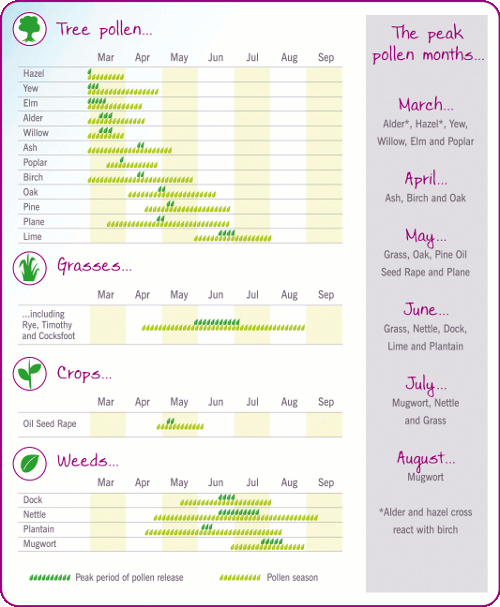Starting in April with tree pollen, the main grass pollen season then follows, with the weed pollen season arriving later in the summer.
Today's Forecast
Tomorrow's Forecast
Annual Pollen Calendar

Pollen Avoidance Advice
Use the pollen calendar to work out which pollen types you are allergic to.
If you have symptoms in June and July it is probably grass pollen.
If you have symptoms in the spring it is probably tree pollen, especially Birch and Oak.
If you suffer in late summer it is probably weeds, and if you have symptoms in the autumn it is probably fungal spores.
Some people are allergic to more than one type of pollen. Several types of pollen have cross reactions.
For example Alder, Hazel, Hornbeam and Birch all have similar allergens so if you are allergic to one you will also react to the others.
Once you have worked out which pollen types you are allergic to it is easier to avoid the problem.
For example, avoid high pollen locations such as areas with un-mown grasses in flower, countryside areas with un-mown verges etc.
Avoid woodland locations in the tree pollen seasons.
Best and worst places regionally
Avoid high pollen regions; Inland lowland areas, such as the Midlands and inland East Anglia typically have high grass pollen counts.
Coastal areas, uplands and moor lands typically have lower grass pollen counts.
Avoid places with high air pollution loads.
The air pollution in cities can make the symptoms of hay fever worse even though the pollen counts may be lower than in rural areas.
General Tips
Avoid going out at peak pollen times. Look at the pollen forecasts on this site.
On high and very high grass pollen count days the worse times are usually in the early morning (7-10am) and late
afternoon ( 4-7pm) as this is when most grasses release their pollen.
Don't dry washing outside on high pollen count days It will collect pollen from the air.
Change clothes and wash hair etc after being out.
Cover bed and desks when not in use and then fold the cover back carefully when you want to use the area.
Pollen is quite heavy and will settle on surfaces quickly.
Keep windows and doors closed to help keep pollen out.
Wear sunglasses and a broad brimmed hat.
Brush or wash your cat or dog as they can carry a lot of pollen in their fur.
When driving keep the windows closed.
If possible drive a car with a good pollen filter.
For some respite, close the windows and doors of a room.
Sit still, and in about 25 minutes most of the pollen in the room will have settled so you will be breathing pollen free air.
Talk to your GP or pharmacist about treatments and remedies. In most cases the symptoms can be controlled.
It is best to combine pollen avoidance measures with other treatments. Service your car air filter regularly.


